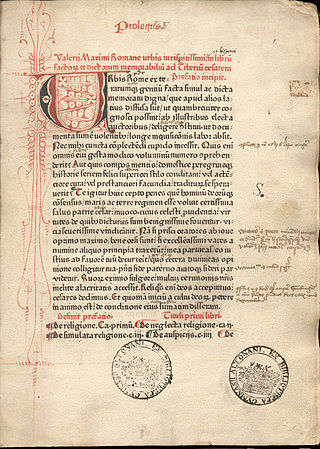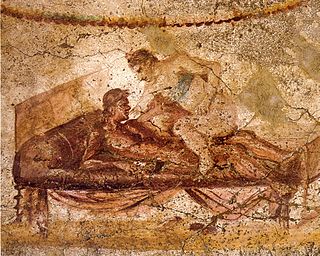
Pudicitia was a central concept in ancient Roman sexual ethics. The word is derived from the more general pudor,the sense of shame that regulated an individual's behavior as socially acceptable. Pudicitia was most often a defining characteristic of women,but men who failed to conform to masculine sexual norms were said to exhibit feminizing impudicitia,sexual shamelessness. The virtue was personified by the Roman goddess Pudicitia,whose Greek equivalent was Aidos.

Valerius Maximus was a 1st-century Latin writer and author of a collection of historical anecdotes:Factorum et dictorum memorabilium libri IX. He worked during the reign of Tiberius.

The History of Sexuality is a four-volume study of sexuality in the Western world by the French historian and philosopher Michel Foucault,in which the author examines the emergence of "sexuality" as a discursive object and separate sphere of life and argues that the notion that every individual has a sexuality is a relatively recent development in Western societies. The first volume,The Will to Knowledge,was first published in 1976;an English translation appeared in 1978. The Use of Pleasure,and The Care of the Self,were published in 1984. The fourth volume,Confessions of the Flesh,was published posthumously in 2018.

The Veneralia was an ancient Roman festival celebrated April 1 in honor of Venus Verticordia and Fortuna Virilis.
The social construction of human sexuality and sexual behavior—along with its taboos,regulation,and social and political impact—has had a profound effect on the various cultures of the world since prehistoric times.

Marriage in ancient Rome was a fundamental institution of society and was used by Romans primarily as a tool for interfamilial alliances. The institution of Roman marriage was a practice of marital monogamy:Roman citizens could have only one spouse at a time in marriage but were allowed to divorce and remarry. This form of prescriptively monogamous marriage that co-existed with male resource polygyny in Greco-Roman civilization may have arisen from the relative egalitarianism of democratic and republican city-states. Early Christianity embraced this ideal of monogamous marriage by adding its own teaching of sexual monogamy,and perpetrated it worldwide and became as an essential element in many later Western cultures.
Greek love is a term originally used by classicists to describe the primarily homoerotic customs,practices,and attitudes of the ancient Greeks. It was frequently used as a euphemism for both homosexuality and pederasty. The phrase is a product of the enormous impact of the reception of classical Greek culture on historical attitudes toward sexuality,and its influence on art and various intellectual movements.

Sexual attitudes and behaviors in ancient Rome are indicated by art,literature,and inscriptions,and to a lesser extent by archaeological remains such as erotic artifacts and architecture. It has sometimes been assumed that "unlimited sexual license" was characteristic of ancient Rome,but sexuality was not excluded as a concern of the mos maiorum,the traditional social norms that affected public,private,and military life. Pudor,"shame,modesty",was a regulating factor in behavior,as were legal strictures on certain sexual transgressions in both the Republican and Imperial periods. The censors—public officials who determined the social rank of individuals—had the power to remove citizens from the senatorial or equestrian order for sexual misconduct,and on occasion did so. The mid-20th-century sexuality theorist Michel Foucault regarded sex throughout the Greco-Roman world as governed by restraint and the art of managing sexual pleasure.

Homosexuality in ancient Rome often differs markedly from the contemporary West. Latin lacks words that would precisely translate "homosexual" and "heterosexual". The primary dichotomy of ancient Roman sexuality was active / dominant / masculine and passive / submissive / feminine. Roman society was patriarchal,and the freeborn male citizen possessed political liberty (libertas) and the right to rule both himself and his household (familia). "Virtue" (virtus) was seen as an active quality through which a man (vir) defined himself. The conquest mentality and "cult of virility" shaped same-sex relations. Roman men were free to enjoy sex with other males without a perceived loss of masculinity or social status as long as they took the dominant or penetrative role. Acceptable male partners were slaves and former slaves,prostitutes,and entertainers,whose lifestyle placed them in the nebulous social realm of infamia,so they were excluded from the normal protections accorded to a citizen even if they were technically free. Freeborn male minors were off limits at certain periods in Rome.

Sulpicia was an ancient Roman woman whose outstanding sexual integrity (pudicitia) earned her the honor of instituting the cult of Venus Verticordia.
The Lex Scantinia is a poorly documented Roman law that penalized stuprum against a freeborn male minor. The law may also have been used to prosecute adult male citizens who willingly took a passive role in having sex with other men. It was thus aimed at protecting the citizen's body from sexual abuse but did not prohibit homosexual behavior as such,as long as the passive partner was not a citizen in good standing. The primary use of the Lex Scantinia seems to have been harassing political opponents whose lifestyles opened them to criticism as being passive homosexuals or pederasts in the Hellenistic manner.

Pederasty or paederasty is a sexual relationship between an adult man and a boy. It was a socially acknowledged practice in Ancient Greece and Rome and elsewhere in the world,such as Pre-Meiji Japan.

Prostitution in ancient Rome was legal and licensed. Men of any social status were free to engage prostitutes of either sex without incurring moral disapproval,as long as they demonstrated self-control and moderation in the frequency and enjoyment of sex. Brothels were part of the culture of ancient Rome,as popular places of entertainment for Roman men.
The following outline is provided as an overview of and topical guide to human sexuality:
David Wardle is the King George V Professor of Classics and Ancient History,as well as a former Acting Dean in the Faculty of Humanities,at the University of Cape Town.

Venus Verticordia was an aspect of the Roman goddess Venus conceived as having the power to convert either virgins or sexually active women from dissolute desire (libido) to sexual virtue (pudicitia). Under this title,Venus was especially cultivated by married women,and on 1 April she was celebrated at the Veneralia festival with public bathing.

Fiona McHardy is a Professor of Classics and also the Head of History and Classics in the School of Humanities and Social Sciences at the University of Roehampton. In 2003 she started work at Roehampton where she was responsible for building up the BA Classical Civilisation. Her research interests include ancient and modern Greek literature,folk poetry,anthropology and culture. She teaches modules on ancient Greek language,literature and culture.
Ruby Blondell is Professor Emerita of Classics and Adjunct Professor Emerita of Gender,Women,&Sexuality Studies at the University of Washington;prior to retirement,they were the Byron W. and Alice L. Lockwood Professor of Humanities also at the University of Washington. Their research centres on Greek intellectual history,gender studies,and the reception of ancient myth in contemporary culture.

Elena Isayev is Professor of Ancient History and Place in the Classics and Ancient History Department at the University of Exeter. She is an expert on migration,hospitality and displacement,particularly in ancient Mediterranean contexts. She works with Campus in Camps in Palestine and she is a Trustee of the charity Refugee Support Devon.
Venus Obsequens was the first Venus for whom a shrine (aedes) was built in ancient Rome. Little is known of her cult beyond the circumstances of her temple founding and a likely connection to the Vinalia Rustica,an August wine festival.














